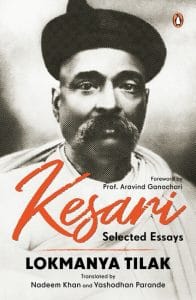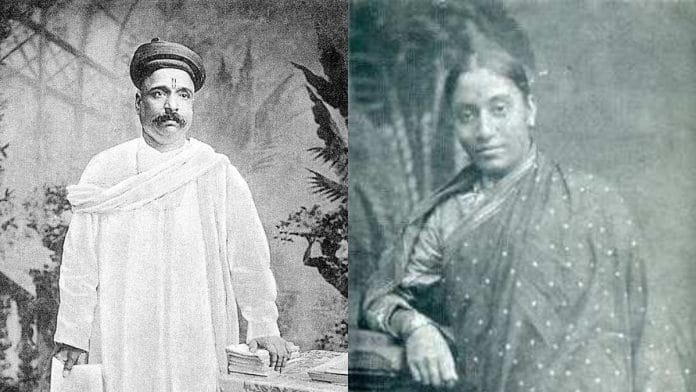The recent decision pronounced by the high court, completely ignoring the Dharmashastras propounded by Maharshi Pinhe, has caused quite a flutter among the reformers who back women’s causes. A combination of ignorance and the dejection of defeat has made them blabber whatever comes to their mind. One says:
What’s this? The high court is supposed to be the seat of justice! How can they trample upon women’s rights like this? What if it is a question of Hindu law? Should the high court not lay down some boundaries? If we are to be governed only by our old laws, why do we need this high court? Just by rescuing Rakhmabai alone from the clutches of her foolish husband, no harm would have come to the Hindu dharmashastras; but imagine how much it would have advanced the cause of reform!
Another worthy writes to that great supporter of Hindu widows, Malabari, thus:
It is in the very nature of this Kali Yuga that the high court should hand down a verdict like this. That a pure woman like Rakhmabai should be tied down by the Court, without her consent, to a lowly man, who is but an animal without a tail or horns! What a great injustice! By crucifying Jesus Christ, the Jews incurred a great sin and invited misfortunes upon themselves, but this is an even greater opprobrium! It is Rakhmabai who is bearing the consequence of our sin, which is the result of our abandoning our Rishi-given dharma. Glory be to you, Rakhmabai, for without caring for people’s sinful views you upheld your ancestors’ honour and set an example for your sisters!
A third smart person asks:
What if Rakhmabai underwent the wedding ceremony? But when did she undergo the garbhadhan ritual? Without that ritual, the marriage ceremony is not complete; at least, one cannot understand how it can be. And if the English government cannot manage this properly, they should resign from their duties and go away. etc.
We have neither the time nor the inclination to answer the above objections. These people—whether they are Hindus or non-Hindus—have no acquaintance with Hindu tradition and rituals, or they pretend not to know the Hindu tradition and rituals. They remember utterances on religion by the judges of this Kali Yuga, but do not remember the laws governing women, they do not understand the difference between a wedding ceremony and a garbhadhan ceremony, and whose ultimate spiritual guides are Mokshamooler, Monier Williams, Pinhe etc., their views have merely to be stated to be rejected.
We freely admit that it is essential that the progress of our women takes place. But we have only this to say to these fake reformers: reform will never happen through the hands of immature and uneducated women like Rakhmabai. Today thousands of men are living happily with their unlettered women. In such a situation is it not surprising that this woman, who is untouched by any trace of knowledge, should apply in a court for divorce on the ground that her husband is unfit for her? And is it not even more surprising that our proponents of reform should beat her tom-tom loudly and incoherently to their heart’s content?
Even among the English, once a marriage is solemnized, irrespective of whether it is consummated, there is no right for a woman to seek a divorce on the ground that she does not like her husband. And if the same case had been lodged in an English court, the woman would have been roundly castigated. The only convenient ground that Rakhmabai has is that, according to the custom here, she was married as a child and the marriage did not have her consent. In our view, this is meaningless. It would not be a bad idea for marriages to happen with the consent of the bride and the groom.
However, if we see the ultimate result, and keep in mind the level of discord that is observed even where the marriages are consensual, we are most doubtful about the benefits that might accrue from changing our tradition that has been going on for long. Moreover, if we consider the present state of our society, this change does not at all seem necessary. Why then this fuss about it?
Also read: Bengali Muslims were ridiculed by Hindus & Urdu speakers. This changed in 1920s
Even if for a moment we admit this [need for reform], still it is not the function of the high court to dwell upon whether some traditional practices should be changed or not. The duty of the high court is to enforce whatever is the law or custom. What the high court has decided—that as long as the common understanding among the people is that once the ritual of saptapadi is done, the marriage is sanctified, and the woman has no right to abandon the husband on the ground that she does not approve of him—is absolutely correct.
Have our proponents of consent ever thought about how many of us would be the legitimate children of our parents if the legal position was that a marriage was not valid unless based on the consent of the two parties? And if such a decision is passed, who will accept it? Our marriages are not based on high court decisions. In short, whichever way one looks at it, it will have to be agreed that the high court’s recent decision is fully in accordance with the Hindu religious scriptures and wholly appropriate. Of course, it would be another matter if, owing to the strenuous efforts of our reformers, the custom of our marriage is changed and aligned with the English custom!
Many say that it is true that according to the Hindu religious scriptures, Rakhmabai’s right does not get established; still it is not fair to send her to jail if she fails to join her husband. This is because the Hindu scriptures do not prescribe imprisonment. This is a fair comment. However, if the high court’s decision cannot be implemented, what would be the point of it? Previously, such disputes were settled by the panchas, and their authority was such that they would drag the woman and hand her over to her husband. Now if one of those rights goes to the high court, the other must too.
The straight path open to Rakhmabai now is to reform her husband and live happily with him. In that lies her true courage and her credit, and we hope that her friends will advise her along these lines and end this misconceived contretemps.

This excerpt from ‘Kesari: Selected Essays’ by Bal Gangadhar Tilak, translated by Nadeem Khan & Yashodhan Parande, has been published with permission from Penguin Random House India.






